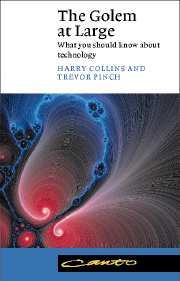Book contents
- Frontmatter
- Contents
- Preface and acknowledgements
- Introduction: the technological golem
- 1 A clean kill?: the role of Patriot in the Gulf War
- 2 The naked launch: assigning blame for the Challenger explosion
- 3 Crash!: nuclear fuel flasks and anti-misting kerosene on trial
- 4 The world according to Gold: disputes about the origins of oil
- 5 Tidings of comfort and joy: Seven Wise Men and the science of economics
- 6 The science of the lambs: Chernobyl and the Cumbrian sheepfarmers
- 7 ACTing UP: AIDS cures and lay expertise
- Conclusion: the golem goes to work
- References and further reading
- Index
7 - ACTing UP: AIDS cures and lay expertise
Published online by Cambridge University Press: 19 August 2009
- Frontmatter
- Contents
- Preface and acknowledgements
- Introduction: the technological golem
- 1 A clean kill?: the role of Patriot in the Gulf War
- 2 The naked launch: assigning blame for the Challenger explosion
- 3 Crash!: nuclear fuel flasks and anti-misting kerosene on trial
- 4 The world according to Gold: disputes about the origins of oil
- 5 Tidings of comfort and joy: Seven Wise Men and the science of economics
- 6 The science of the lambs: Chernobyl and the Cumbrian sheepfarmers
- 7 ACTing UP: AIDS cures and lay expertise
- Conclusion: the golem goes to work
- References and further reading
- Index
Summary
On 24 April 1984, Margaret Heckler, US Secretary of Health and Human Services, announced with great gusto at a Washington press conference that the cause of AIDS had been found. A special sort of virus – a retrovirus – later labelled as HIV, was the culprit. Vaccinations would be available within two years. Modern medical science had triumphed.
Next summer, movie star Rock Hudson died of AIDS. The gay community had lived and died with the disease for the previous four years. Now that the cause of AIDS had been found and scientists were starting to talk about cures, the afflicted became increasingly anxious as to when such cures would become available. Added urgency arose from the very course of the disease. The HIV blood test meant lots of seemingly healthy people were facing an uncertain future. Was it more beneficial to start long-term therapy immediately or wait until symptoms appeared? Given the rapid advance in medical knowledge about AIDS and the remaining uncertainties (even the cause of AIDS was a matter of scientific debate), was it better to act now with crude therapies or wait for the more refined treatments promised later?
AIDS: THE ‘GAY PLAGUE’
AIDS is not confined to homosexuals, but in the US it was first described in the media as the ‘gay plague’ and gays as a community were quick to respond to its consequences. The gay community in the US is no ordinary group.
- Type
- Chapter
- Information
- The Golem at LargeWhat You Should Know about Technology, pp. 126 - 150Publisher: Cambridge University PressPrint publication year: 2002
- 1
- Cited by

